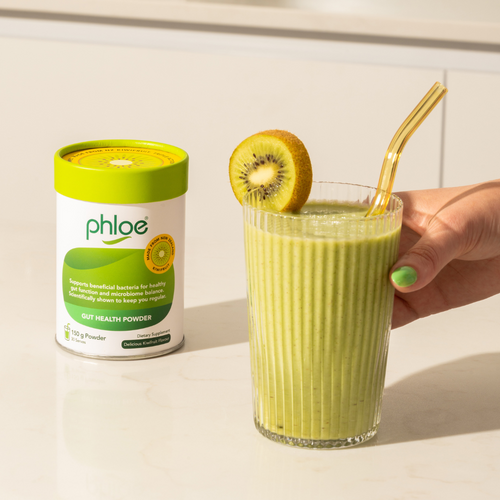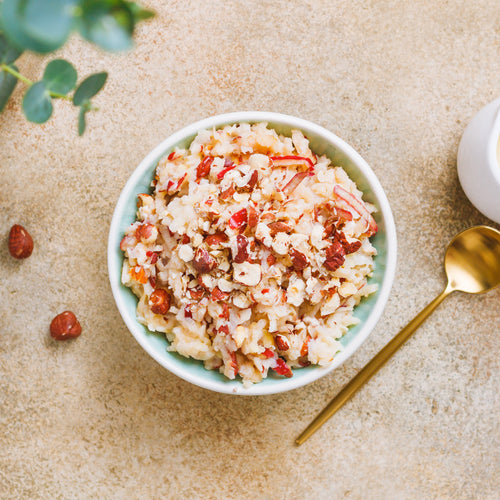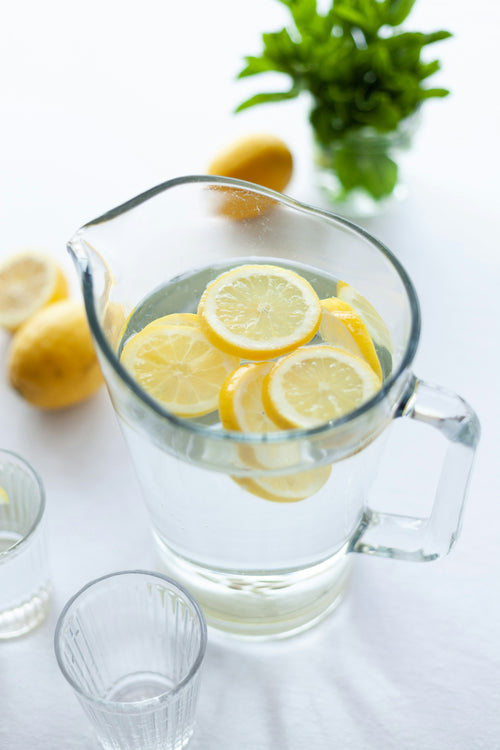Having a motion at least once a day is a sign of good digestive health. But the frequency of bowel movements in children can vary. Which can depend on various factors. And there can be all sorts of reasons why they might have trouble doing number two’s.
What causes constipation in kids?
There are a range of reasons why kids might be struggling with bowel movements. Such as:
- Not enough water intake
- A diet low in fibre (fresh fruit and veggies, nuts, seeds and grains)
- Food intolerances
- Lack of physical activity
- Not going to the toilet for fear of discomfort
- Certain medications or medical conditions
These can exacerbate the difficulty of passing stools. And can lead to slow and uncomfortable bowel movements. Addressing the causes and changing habits can help with regular bowel movements.
What’s a healthy poo?
Let’s get to the bottom of what a healthy poo is. It might sound a little unpleasant. But when trying to find a natural solution, it helps to have as much information as possible.
A daily bowel movement is a good sign of healthy digestion for children. Their stool should resemble a soft sausage, like Types 3 and 4 in the diagram below.
**
But it they are a bit more like Type 1 or 2, there may be some underlying issues that you need to address. They may be showing signs of not wanting to go to the toilet in tears or tantrums. It might be too difficult or uncomfortable for them.
Here are some warning signs to look out for:
- Small hard lumps like pebbles (Type 1)
- Hard, large poo (Type 2)
- No pooing for 3 or more days
- Crying or pain during bowel movements
- Blood on the poo (due to a potential tear on the skin)
- Tummy pain
- Refusing or avoiding going to the toilet
The sooner you can catch on to these signs the better. Anxiety about using the toilet can create a vicious cycle for children.
Is it a food intolerance?
Food intolerances can contribute to constipation in children. Common intolerances include dairy and gluten. These intolerances can disrupt the digestive system, leading to difficulties with bowel movements. For instance, dairy products may cause constipation in children with lactose intolerance. Gluten-containing foods like wheat, barley, or rye can trigger constipation. Especially in those with gluten sensitivity.
Identifying and avoiding trigger foods is crucial for managing constipation. Parents need to observe any patterns between their child's diet and bowel movements (or lack of). Consulting with a healthcare professional can also help identify potential food intolerances. This usually involves dietary modifications or an elimination diet to address the issue.
How can you influence regular toilet visits?
-
Establish a poo time - try to work out when your child needs to poo and encourage them to sit on the toilet for about 5 mins. Help them to relax - sing, colour, read stories. This will aid with training their bowel to relax. Routine is the key!
-
Keep them active – encourage either competitive sports or outdoor activities. Such as cycling, skateboarding or riding a scooter.
-
Healthy eating habits – reduce their intake of ready-made food and takeaways. Sugar, refined grains (pasta, white bread) and processed meats should also be avoided. Try to integrate more fruit, veggies, wholegrain bread, beans and simple, unprocessed meats.
-
Drink plenty of water - you can measure their ideal daily water intake by multiplying their weight by 30. (30x25kg=750ml). Get them a water bottle they really like for encouragement.
-
Food intolerances – check for food sensitivities and change their diet where needed.
-
Stress and anxiety – a relaxed, happy child is more likely to have regular bowel movements.
-
Healthy gut flora – keep their gut microflora in check. Antibiotic use and food sensitivities lead to imbalances. Daily probiotic supplementation can help.
- Food to poo – find a food or food group that helps them do number two’s. It might be something like berries, cucumber, celery, kiwifruit or stewed/fresh pear. Once you’ve worked it out, it can be your ‘go-to’ when needed.
Food ideas to get things moving
There are plenty of foods that you can incorporate into meals to help get things moving. These meal suggestions can help encourage regular bowel movements and prevent constipation:
(Ensure gluten or dairy-free for intolerances)
1. Brekkie:
- Whole grain cereal or oatmeal, topped with fresh fruits like berries or sliced bananas. Check out this recipe: Recipe. Apple Bircher Muesli or Porridge
- Whole wheat/grain toast with nut butter and banana.
- Smoothies with frozen berries, spinach, and flaxseed, sunflower or pumpkin seeds.
2. Lunches:
- Whole grain wraps or bread with protein (e.g. chicken, tofu), salad greens, tomato, cucumber and avocado. Add some hummus for extra flavour.
- Quinoa or brown rice bowls with edamame beans, roasted vegetables and a protein source (e.g., beans, tofu, chicken).
3. Dinner:
- A combination of vegetables, grains, legumes or beans and protein, healthy fats.
- Soups – all manner of veggies, legumes and beans can be easily disguised in a tasty soup. Check out this recipe: Hearty Tomato and Lentil Soup
4. Snacks:
- A mix of dried fruits, nuts, and seeds.
- Yoghurt with added ground flaxseed or chia seeds.
- Fibre-rich fruits such as apples, pears, oranges, and prunes with a dollop of nut butter.
5. Hydration:
- Encourage regular water intake throughout the day to maintain hydration and soften stools.
- Include hydrating foods like watermelon, cucumbers, and soups.
6. Dietary supplements:
- Kiwifruit contains fibre, prebiotics and enzymes. Phloe Bowel Health contains the perfect amount of kiwifruit to help keep kids regular. There are two options for kids: Phloe chewable tablets for 9+ years and the Phloe Kids for 3+ years.
In summary….
- Maintain regular bowel movements for long-term digestive health.
- Factor in water intake, a fibre-rich diet, physical activity, and establishing a routine.
- Identify and address food intolerances, manage stress and anxiety. Make sure they have healthy gut flora.
- Incorporate foods like whole grains, fruits, and vegetables in their daily diet.
- Finally, Phloe Bowel Health is derived from kiwifruit. It offers a natural solution for children to maintain regularity.






